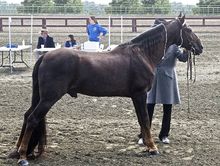According to a Tennessee Walking Horse publication, a federal judge today will decide whether to accept a horse trainer’s guilty plea in a case that sparked a firestorm of public outcry over abuse in the Tennessee walking horse industry.

A typical Tennessee Walking horse
Jackie McConnell is expected to be sentenced to probabion for the abusive practice of horse soring despite public cries for a harsher sentence.
© 2012 by Kersti Nebelsiek
Representatives from the Humane Society will be in thte Chattanooga Courtroom where Jackie McConnell is expected to be sentenced to probabion. U.S. Sen. Joe Tydings, a Democrat from Maryland and the author of the original Horse Protection Act in 1970 will also be present. A number of McConnell’s friends and family are also expected to be present.
Earlier this month, when McConnell’s sentencing was delayed a week, Doyle Meadows, the retiring CEO of the Tennessee Walking Horse National Celebration, said the organization already had taken the strongest action it could: handing McConnell a lifetime ban from the Celebration grounds and events, as well as stripping him of his previous status in the Celebration’s hall of fame.
“As far as we are concerned, the only place Jackie McConnell belongs is in a jail cell, and it is unfortunate that he is not being prosecuted under the new Tennessee horse cruelty law,” Doyle said in a prepared statement.
Under federal court sentencing guidelines, McConnell is not eligible for jail time because he has no criminal history. His previous soring violations were handled as civil administrative cases, not crimes.
Horse soring, abusing a horse with acids, chains and foreign objects in their shoes or pads to enhance their high-stepping gait, is not a crime federally. But transporting a sored horse for a show or sale is a federal misdemeanor.
In May, McConnell pleaded guilty to conspiring to violate the Horse Protection Act by substituting other names in place of his as the trainer of sored horses while he served a five-year license suspension for previous soring. Falsifying a show form by saying someone else is the trainer constitutes conspiracy, a felony.
The maximum punishment is five years’ imprisonment, three years supervised release and a $250,000 fine. But McConnell, as a first-time felony offender, is not eligible for that sentence.
Prosecutors are asking for a full five-year probation period and the maximum $250,000 fine, as well as McConnell’s complete abstention from the horse business in any manner other than as a spectator.
Shortly after McConnell pleaded guilty, the Humane Society of the United States released on prime-time television a portion of a hidden-camera video it collected and turned over about a year ago to the U.S. Department of Agriculture and to local U.S. attorneys Bill Killian and Steve Neff.
The video of abuse ignited a firestorm of public anger just as the annual Tennessee Walking Horse National Celebration was about to begin in mid August.
Neff and Killian received phone calls from angry citizens demanding to know why they are recommending probation for McConnell. The clamor led prosecutors to file a 16-page explanation that points out the limitations of their case.
“While the government is cognizant of and shares the sentiments of the public outcry and desire to see significant jail time imposed on violators … the sad reality is that the law passed by Congress does not possess significant teeth,” Neff wrote.
A week later, defense attorneys filed a counter memorandum, noting that letters to the court from McConnell’s friends and family offer a different view of the former national trainer of the year.
Defense attorneys Hugh J. Moore Jr. and Tom Greenholtz said the government simply wants “to redeem itself” from criticism. And they said McConnell has suffered enough.
Moore and Greenholtz argue that U.S. Department of Agriculture, which oversees the enforcement of the Horse Protection Act , has fined McConnell $150,000, and that, coupled with his federal arrest, seizure of property, indictment and conviction as a felon, is plenty of punishment.
Late Friday, prosecutors filed a rebuttal, saying McConnell cannot claim to fully accept responsibility while simultaneously objecting to the legal consequences of breaking the law.
“[McConnell] is not the victim in this case; the horses he harmed and anyone who may have been defrauded due to the defendant’s cheating and crimes are the victims,” Neff and Killian wrote.
